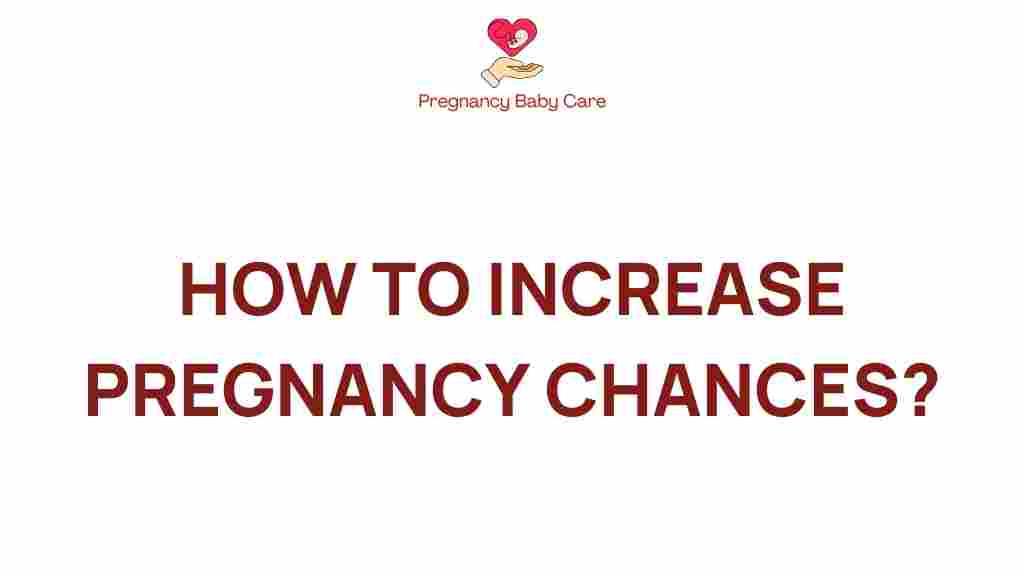Unlocking the Secrets: How to Increase Pregnancy Chances
For couples trying to conceive, understanding how to increase pregnancy chances can be a complex journey filled with emotion, anticipation, and hope. With a plethora of fertility tips available, it can be overwhelming to know where to start. This comprehensive guide will delve into various aspects of reproductive health, including ovulation, lifestyle changes, health optimization, emotional wellbeing, and nutrition, to provide you with the knowledge you need to enhance your fertility.
Understanding Your Fertility
Before making any changes, it’s vital to understand the basics of your reproductive health. Here are some key factors that influence pregnancy chances:
- Ovulation: This is the release of an egg from the ovaries, which is crucial for conception. Knowing when you ovulate can significantly increase your chances of becoming pregnant.
- Menstrual Cycle: A regular menstrual cycle typically indicates a healthy reproductive system. Understanding your cycle can help identify your fertile window.
- Health Conditions: Certain medical conditions can affect fertility, including polycystic ovary syndrome (PCOS) and endometriosis. It’s essential to consult a healthcare professional if you suspect any issues.
Step-by-Step Guide to Increasing Pregnancy Chances
Now that you have a foundational understanding, let’s explore effective strategies to enhance your chances of conception.
1. Track Your Ovulation
Knowing when you ovulate can significantly increase your pregnancy chances. Here are a few methods to track ovulation:
- Calendar Method: Keep track of your menstrual cycle on a calendar. Ovulation usually occurs about 14 days before your next period.
- Basal Body Temperature (BBT): Take your temperature every morning before getting out of bed. A slight increase in BBT can indicate ovulation.
- Ovulation Predictor Kits: These kits measure hormone levels in your urine to predict ovulation.
2. Optimize Your Lifestyle
Making specific lifestyle changes can have a profound impact on your fertility:
- Maintain a Healthy Weight: Both underweight and overweight individuals can experience fertility issues. Aim for a balanced weight through diet and exercise.
- Exercise Regularly: Moderate physical activity can boost fertility, but avoid excessive exercise, which may hinder ovulation.
- Avoid Smoking and Excessive Alcohol: Both smoking and high alcohol intake can negatively affect fertility.
3. Nutrition for Fertility
The food you eat plays a crucial role in your reproductive health. Focus on a balanced diet that includes:
- Fruits and Vegetables: These are rich in antioxidants, which can improve fertility.
- Whole Grains: Opt for whole grains over refined carbs to maintain steady blood sugar levels.
- Healthy Fats: Incorporate sources of healthy fats, such as avocados and nuts, which are beneficial for hormone production.
Consider consulting a nutritionist to tailor a diet plan that optimizes your fertility.
4. Manage Stress and Emotional Wellbeing
Emotional wellbeing is often overlooked in the fertility journey. Here are some tips to manage stress:
- Mindfulness and Meditation: Practices like yoga and meditation can reduce stress and improve your emotional state.
- Support Groups: Connecting with others going through similar experiences can provide emotional support.
- Counseling: If stress becomes overwhelming, consider seeking professional help.
Troubleshooting Common Fertility Issues
Even with the best intentions, some couples may face challenges. Here are some troubleshooting tips:
- Irregular Cycles: If your cycles are irregular, consult a healthcare provider to discuss potential underlying issues.
- Low Libido: Stress, hormonal imbalances, and relationship issues can affect libido. Open communication with your partner can help address this.
- Unexplained Infertility: If you’ve been trying to conceive for over a year without success, it may be time to consult a fertility specialist.
When to Seek Professional Help
If you and your partner have been actively trying to conceive for over a year (or six months if you’re over 35), it’s advisable to seek professional help. A fertility specialist can conduct tests to identify any underlying issues affecting your pregnancy chances.
Learn more about fertility specialists and what to expect during your visit.
Conclusion
Increasing pregnancy chances involves a multifaceted approach, combining knowledge about ovulation, lifestyle changes, nutritional optimization, and emotional wellbeing. By implementing these fertility tips, you can create an environment conducive to conception. Remember, every couple’s journey is unique, and it’s essential to be patient and compassionate with yourself throughout the process.
For more information on reproductive health and fertility resources, check out this informative guide.
Whether you’re just starting your journey or have been trying for some time, know that there are many paths to parenthood. Stay informed, stay hopeful, and take proactive steps to enhance your chances of a successful conception.
This article is in the category Pregnancy and created by PregnancyBabyCare Team
